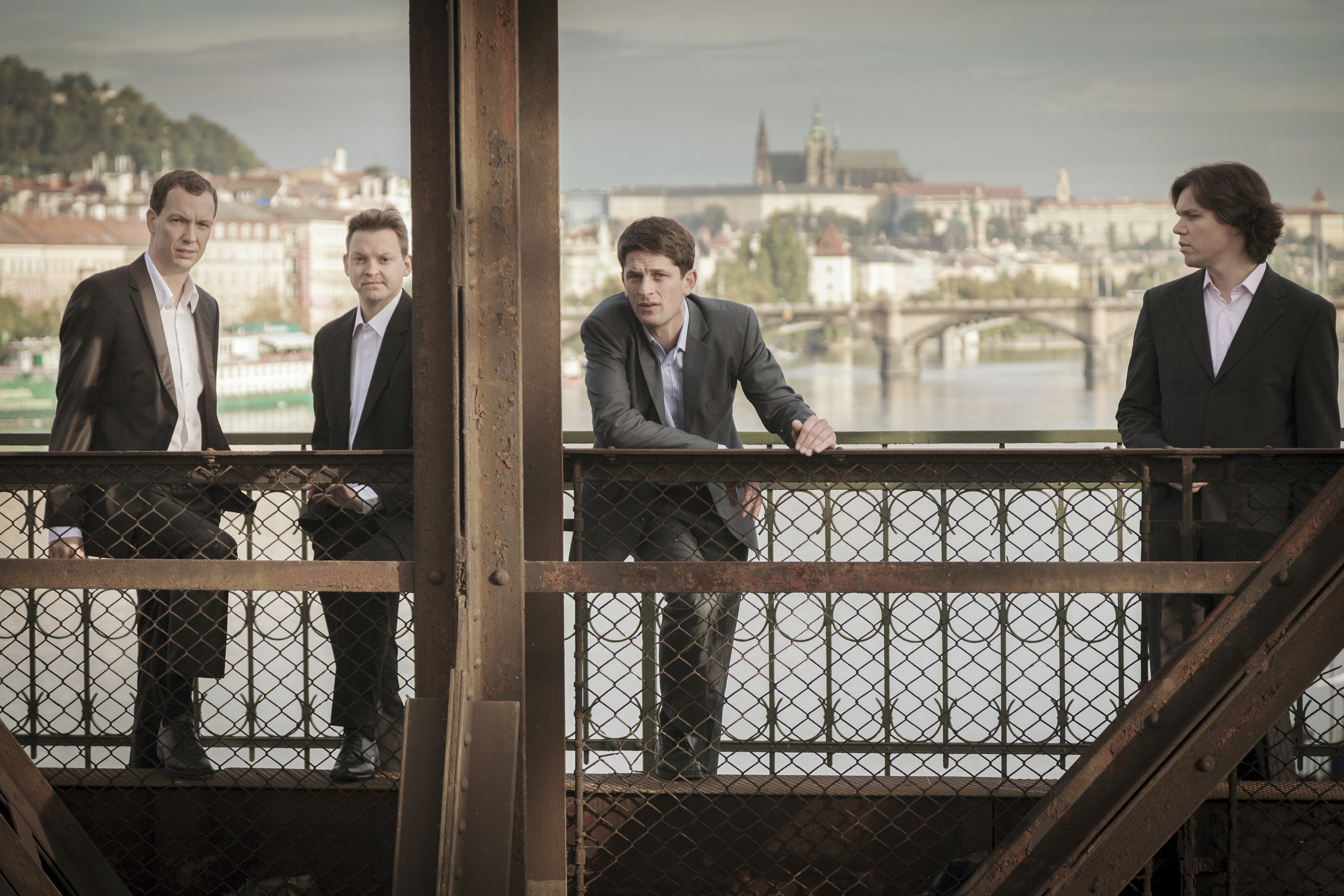 |
| Photo: ©Kamil Ghaisption |
Carping aside, the concert was still wonderful. If he were writing this blogpost, my husband would doubtless observe that the viola player in particular attracted my attention (as does the German actor Henry Arnold or the President of France for that matter, with their similar good looks).
Enough of that; let's concentrate on the music, which in this concert was all Czech. The Ambassador of the Czech Republic said a few words from the front row, the second violinist made the rest of the introductions, and the first piece we heard was Dussek's Quartet in E-flat major, Op. 60. Dussek (1760-1812) is better known for his piano music, but he also created a large output of other chamber music, including three string quartets. This was the last of these. We were encouraged to listen for the classical and romantic elements in this piece which can be classified as "pre-romantic".
Here's the Scherzo:
 |
| Janacek and his wife when young |
They had played so well that Chris and I decided to stay for the second half of the concert despite that noisy competition from the air conditioners. This time we heard Smetena's From My Life (Z mého života) Quartet, the work that first attracted my husband to chamber music. Czechs always feel that Smetana expresses their soul better than does Dvorak; especially when they hear his most patriotic, symphonic work Ma Vlast, Smetana is the Czech composer. Both Ma Vlast and From My Life were late works from the 1870s, after he had lost his hearing. The quartet expresses a personal turmoil, Smetana trying to come to terms with his tragic memories of the 1850s when three of his children and then his wife died. Although mostly in the minor, it is not unhappy music. The second movement is a Polka, the Czech (not Polish) national dance, and the gentle Largo was written in memory of his wife. The Vivace at the end first expresses his sense of triumph at having succeeded as a composer, but then comes the sudden long note, the harmonic high E on the violin that signifies the tinnitus he heard as he began to go deaf. Touchingly, the previous movement's wife-theme returns as a consolation after this fateful shock, and so the quartet ends, resolving gently into the major, on a soft pizzicato.
As the second violinist said, "It's a very beautiful music!"
Of course, the following day I was back in town to hear the Bennewitz Quartet perform again. At this event they offered only two pieces of music: Schubert's great Death and the Maiden Quartet followed by a quartet by Dvorak after the intermission. What sets professionals such as these apart is their mastery of pianissimo playing. I also noted their utter subservience to the music and their respect for one another. If you are going to do this properly, there is no room for egotism. A good lesson for all those in the public eye, if you ask me.
Once more, the second violinist stood up to tell us about the music. This Quartet in D minor, no. 14, was one of the last things Schubert ever wrote, knowing (in 1824, at the age of 27) that his life would soon come to an end, or so people claim. That's debatable, although he did know he had syphilis, but the solemnity and the emotion is certainly there, especially in the way the Bennewitz Quartet handled it. This piece of music is 40 minutes long. I have heard it several times before played live, but this was the best performance I've heard to date. The Andante movement is the one based on Schubert's song of seven years earlier, with five variations of that theme.
Dvorak's Quartet in G, Op. 106, No. 13, may also have been written with death in mind, or at least Dvorak thought of his end when he heard it rehearsed for the first time because on that occasion he abruptly left the hall during its Adagio movement in which all four strings are given highly melodic lines. When someone went out to find out what was the matter, and whether the instrumentalists had upset him with their interpretation, Dvorak was found standing by the river in an emotional state, and he said, "I just realised that I'll probably never write anything so beautiful again!"
We were told a little more about the composer. He had come from a a "gloomy, impoverished background" and music had been his escape. He became internationally famous, especially when asked by New York City to move there to direct its new Conservatory of Music. Travelling back and forth Dvorak also used to write his music aboard transatlantic steamships, including this and his previous (Op. 105) quartet. During the time he spent living in America he was also invited to visit a Czech settlement in Iowa constructed in the style of a Bohemian village, and wrote some of his "most enjoyed pieces" there, as Stepan Jezek of the Bennewitz Quartet put it.
Incidentally, in his last few years, Dvorak succeeded Antonin Bennewitz (for whom the ensemble is named) as director of the Prague Conservatory.

No comments:
Post a Comment